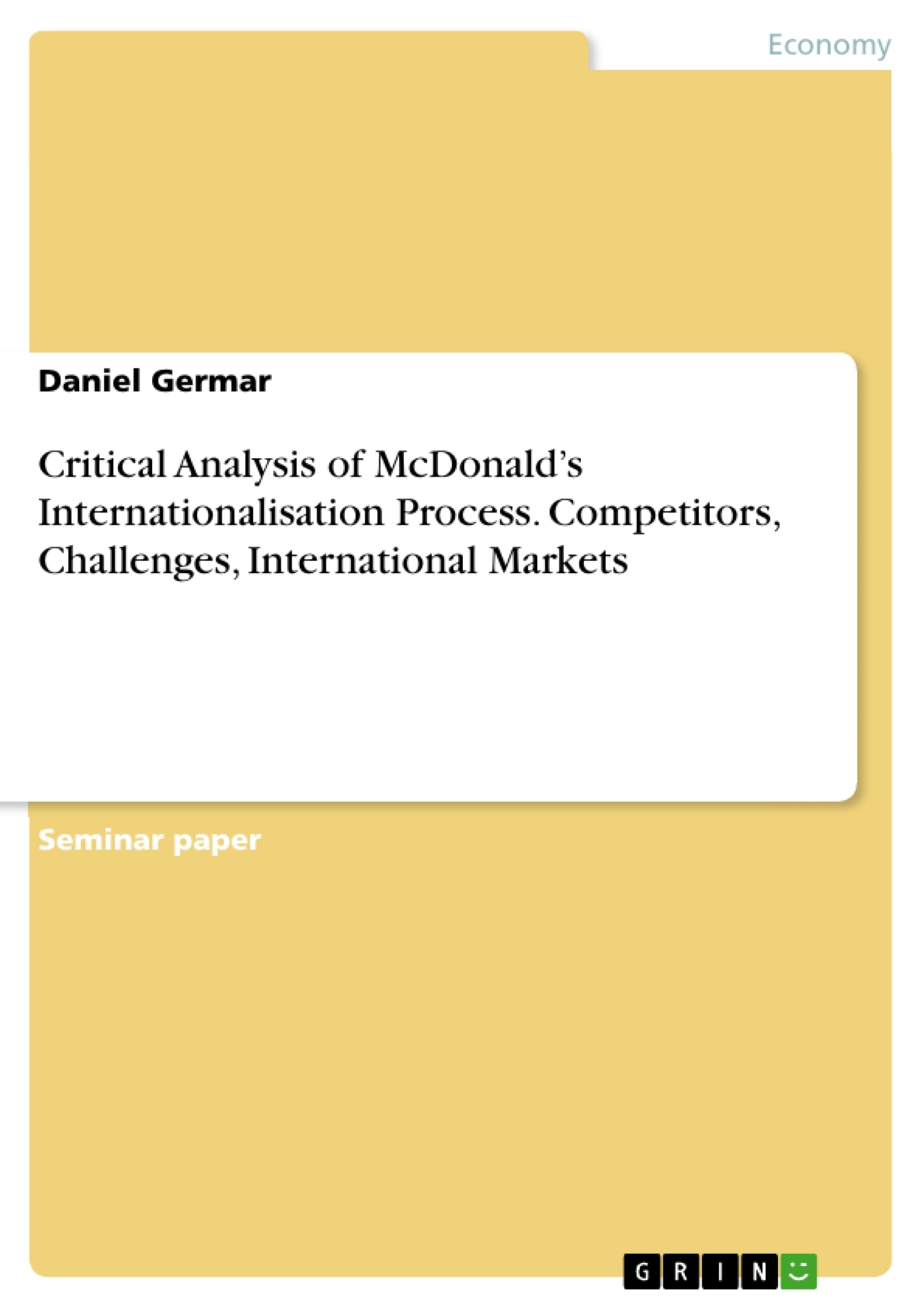1.1 Company Profile
In terms of both revenue and brand value, McDonald’s founded in California in 1940 with its headquarters in Oak Brook, Illinois is arguably the most well-known fast food chain in the world. The company serves a locally relevant-menu of various food items, soft drinks and other beverages. The corporation is so globalized that the Big Mac Index is a standard indicator for measuring the purchasing power parity between countries.[1]
To obtain operational growth, McDonald’s works aggressively on becoming a 95% franchise entity by 2018. Approximately 235.000 people were employed as of year-end 2017 in the 36.000 stores in 120 different countries. With its franchise model, the corporation is similar to a large real estate company which is structured into four segments: the largest market is the United States; international lead markets including France, UK, Canada, Australia and Germany; the high growth markets including China, Italy, Poland, Russia, South Korea, Spain, Switzerland, Netherlands and the foundational markets, including 100+ countries are also relevant.[2]
Although the annual revenues are decreasing from year to year, the company’s profitability shows a positive development. In the restaurant industry, McDonald’s generates a significant part of the company’s operating income outside the United States. With a regard for volatility risks in connection with foreign currency changes, the effective income tax rate for 2018 is expected to be in the 25-27%. Nevertheless, there are no significant capital investments required through the gains in franchisee royalties[3] to attempt benefits for McDonald’s shareholders for the long term.[4]
Table of Contents
- Internationalisation of McDonald's
- Company Profile
- News-related influences and major competitors
- Cultural challenges
- Key external drivers in the I/R Framework
- Classification into a corporate culture typology
- Critical Evaluation and strategic obstacles
- Market selection and entry mode
- Timing and allocation
- IMGT classification
- Conclusion
Objectives and Key Themes
This scientific term paper critically analyzes McDonald's internationalization process, exploring its key drivers, cultural challenges, and strategic obstacles. The study delves into how McDonald's has navigated the complexities of global expansion, adapting to diverse consumer preferences and market dynamics.
- McDonald's global expansion strategy and its impact on the company's success
- The role of cultural differences in shaping McDonald's internationalization efforts
- The challenges and opportunities associated with McDonald's franchise model
- The strategic decisions and factors influencing McDonald's market entry and growth
- The influence of news-related factors and major competitors on McDonald's international business operations
Chapter Summaries
- Internationalisation of McDonald's: This chapter provides an overview of McDonald's as a company, including its founding, headquarters, and its global reach. It highlights the company's franchise model and its strategic business units, categorized by market size and growth potential. The chapter also discusses McDonald's financial performance and the challenges associated with foreign currency fluctuations.
- News-related influences and major competitors: This chapter examines the impact of news-related events and public perception on McDonald's business. It highlights the importance of cultural sensitivity in international markets, using the example of China's meat scandal in 2012. The chapter also discusses McDonald's competitive landscape, including its major competitors like Starbucks, Yum! Brands, and local restaurants, and the challenges posed by unpredictable changes in consumer demands and technological advancements.
- Cultural challenges: This chapter explores the cultural challenges that McDonald's faces in its internationalization process. It discusses the importance of glocalization, or adapting to local consumer trends and preferences while maintaining a global brand identity. The chapter also examines the EPRG scheme, a framework for understanding different approaches to international business operations, and how McDonald's has adopted a polycentric staffing policy to address cultural diversity.
Keywords
The primary keywords and focus topics of this paper include internationalization, fast food, franchising, global marketing, cultural adaptation, glocalization, EPRG scheme, competitive landscape, and strategic obstacles.
Frequently Asked Questions
What is McDonald's global franchise goal for 2018?
McDonald's aims to become a 95% franchised entity by 2018 to ensure operational growth and reduce capital investment requirements.
What are McDonald's four primary market segments?
The company structures its operations into: the United States, International Lead Markets (e.g., UK, Germany), High Growth Markets (e.g., China, Italy), and Foundational Markets (100+ other countries).
How does McDonald's handle cultural diversity in its staff?
McDonald's often employs a polycentric staffing policy, which focuses on hiring local management to better navigate local consumer preferences and cultural nuances.
What is "Glocalization" in the context of McDonald's?
Glocalization refers to adapting the menu and marketing to local tastes (locally relevant menu) while maintaining a consistent global brand identity.
What are the main competitive challenges for McDonald's?
Beyond global rivals like Starbucks and Yum! Brands, McDonald's faces pressure from local restaurants, changing health trends, and unpredictable issues like international food safety scandals.
What is the significance of the Big Mac Index?
Because McDonald's is so globalized, the Big Mac Index is used as a standard economic indicator to measure purchasing power parity (PPP) between different countries.
- Arbeit zitieren
- Daniel Germar (Autor:in), 2018, Critical Analysis of McDonald’s Internationalisation Process. Competitors, Challenges, International Markets, München, GRIN Verlag, https://www.grin.com/document/444526



